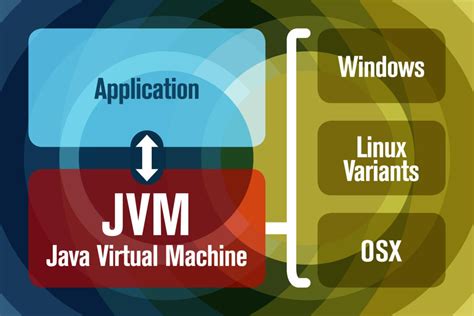As a fundamental component of the Java ecosystem, the Java Virtual Machine (JVM) plays a crucial role in executing Java bytecode on various platforms. The JVM provides a platform-independent environment for running Java programs, making it an essential part of Java's "write once, run anywhere" philosophy. However, with numerous JVM options available, selecting the most suitable one for a specific application or use case can be overwhelming. This comprehensive guide aims to provide an in-depth exploration of the various JVM options, their features, and use cases, helping developers make informed decisions when choosing a JVM for their projects.
Key Points
- The Java Virtual Machine (JVM) is a crucial component of the Java ecosystem, providing a platform-independent environment for executing Java bytecode.
- There are several JVM options available, each with its strengths, weaknesses, and use cases.
- OpenJDK, Oracle JDK, and IBM JDK are some of the most popular JVM options, with differences in licensing, features, and support.
- Specialized JVMs, such as GraalVM and Zing, offer optimized performance, low latency, and real-time capabilities for specific applications.
- Understanding the trade-offs between different JVM options is essential for selecting the most suitable one for a particular project or use case.
Overview of JVM Options

The JVM landscape has evolved significantly over the years, with various vendors and open-source projects offering their own implementations. The primary JVM options can be categorized into three main groups: OpenJDK, proprietary JDKs, and specialized JVMs. OpenJDK is an open-source implementation of the JVM, providing a free and community-driven alternative to proprietary JDKs. Proprietary JDKs, such as Oracle JDK and IBM JDK, offer commercial support, additional features, and optimized performance. Specialized JVMs, like GraalVM and Zing, are designed for specific use cases, such as cloud-native applications, real-time systems, and low-latency trading platforms.
OpenJDK
OpenJDK is an open-source implementation of the JVM, providing a free and community-driven alternative to proprietary JDKs. OpenJDK is widely used in production environments, with many organizations relying on its stability, security, and performance. The OpenJDK project is maintained by the OpenJDK Community, with contributions from various vendors, including Oracle, IBM, and Red Hat. OpenJDK offers a range of features, including support for Java 8, 11, and 17, as well as experimental features like Project Loom and Project Panama.
| JDK Version | OpenJDK Features |
|---|---|
| Java 8 | Support for Java 8, including lambda expressions, method references, and functional programming. |
| Java 11 | Support for Java 11, including var keyword, HTTP client, and improved performance. |
| Java 17 | Support for Java 17, including sealed classes, hidden classes, and improved security. |

Proprietary JDKs
Proprietary JDKs, such as Oracle JDK and IBM JDK, offer commercial support, additional features, and optimized performance. Oracle JDK, in particular, is widely used in enterprise environments, with many organizations relying on its stability, security, and performance. Oracle JDK offers a range of features, including support for Java 8, 11, and 17, as well as advanced features like Java Flight Recorder and Java Mission Control. IBM JDK, on the other hand, is designed for IBM-specific platforms, including AIX, z/OS, and IBM i.
Specialized JVMs
Specialized JVMs, like GraalVM and Zing, are designed for specific use cases, such as cloud-native applications, real-time systems, and low-latency trading platforms. GraalVM, for example, offers a high-performance JVM with optimized performance, low latency, and real-time capabilities. Zing, on the other hand, is designed for low-latency trading platforms, offering a JVM with optimized performance, low latency, and real-time capabilities.
Comparison of JVM Options

When choosing a JVM, it’s essential to consider the trade-offs between different options. The following table provides a comparison of the main JVM options, highlighting their features, strengths, and weaknesses.
| JVM Option | Features | Strengths | Weaknesses |
|---|---|---|---|
| OpenJDK | Free, open-source, community-driven | Stability, security, performance | Limited commercial support |
| Oracle JDK | Commercial support, advanced features | Optimized performance, security, support | Cost, licensing restrictions |
| IBM JDK | IBM-specific platforms, optimized performance | Stability, security, performance on IBM platforms | Limited support for non-IBM platforms |
| GraalVM | High-performance JVM, optimized performance | Optimized performance, low latency, real-time capabilities | Complexity, limited support |
| Zing | Low-latency JVM, optimized performance | Optimized performance, low latency, real-time capabilities | Cost, limited support |
What is the difference between OpenJDK and Oracle JDK?
+OpenJDK is an open-source implementation of the JVM, while Oracle JDK is a commercial implementation with additional features and support. OpenJDK is free and community-driven, while Oracle JDK requires a commercial license for production use.
What is the best JVM for cloud-native applications?
+GraalVM is a high-performance JVM with optimized performance, low latency, and real-time capabilities, making it an ideal choice for cloud-native applications.
What is the difference between GraalVM and Zing?
+GraalVM and Zing are both specialized JVMs, but they have different design goals and use cases. GraalVM is designed for cloud-native applications, while Zing is designed for low-latency trading platforms.
In conclusion, selecting the most suitable JVM for a specific application or use case requires careful consideration of the trade-offs between different options. By understanding the features, strengths, and weaknesses of each JVM option, developers can make informed decisions and choose the best JVM for their projects. Whether it’s OpenJDK, Oracle JDK, IBM JDK, GraalVM, or Zing, each JVM has its unique characteristics, and selecting the right one can significantly impact the performance, security, and scalability of Java applications.



